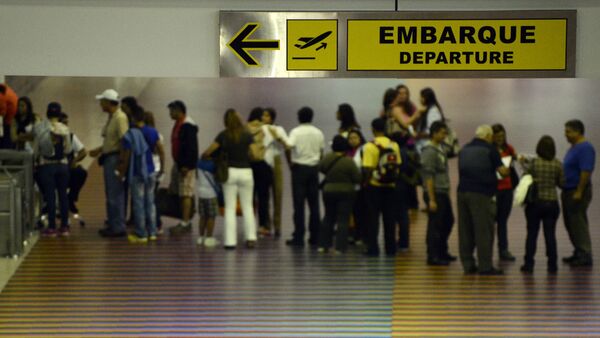While a few lucky people eventually get their longed-for tickets out of Caracas, those stranded at the airport can either patiently wait or take their frustration out on airlines' staff.
After the political crisis in Caracas turned the international spotlight on the Latin American country, journalists from around the world flew off to Venezuela in search of media sensations and entrepreneurs rushed to Caracas to protect their business interests. Little did they know that they would have to spend slightly more time in Venezuela than they expected because of the incident at the Guri dam, which caused the worst power outage in the country's history.
READ MORE: Venezuelan Army Introduces Air Surveillance Over Power Lines After Blackout
The first thing that grabs your attention as you arrive at the airport is the fact that there are no luggage screening systems or passport control at the entrance, so basically anyone can enter the building without any difficulty whatsoever.
READ MORE: Venezuela Parliament Declares State of 'Alarm' Over Blackout — Reports
When you enter the international departure terminal, you get overwhelmed by the crowd of hundreds of people, all of whom have the same expressions of frustration, fatigue and outrage on their faces. While some passengers are patiently waiting in lines at check-in desks, others have settled in local cafes and some simply stretched out on the floor, waiting for any new information about their flights.
"My husband and I have been unable to leave for over a week… When they first told us that our flight had been cancelled, we were stricken with panic. We never planned to get stuck in Caracas, one of the most dangerous cities in the world. We have come here [airport] twice since then — both times to no avail. Those who come to the airport hoping to fly off from the very first attempt will be very disappointed," a 63-year-old Spanish woman told Sputnik.
Her 65-year-old spouse recalled that just a few days ago there was a blackout in the airport and passengers had to wait for their flights for up to 10 hours in the non-air conditioned airport.
"The electronic screens did not work, [the passengers] were checked in manually, their luggage was carried away on trolleys. All of the cafes and most of restrooms were closed. It was so hot that even concrete walls could not shield us from the heat and people started to feel dizzy because of the stifling heat," the man said.
Some of the passengers could not take in any more and lashed out at airlines' staff, who tried to convince them to stay calm and just wait, the man added.
"Although, it seems to me that they [the passengers] became even more infuriated by that," he said.
At that very moment, a whimper is heard behind his back — a baby who had been peacefully sleeping in his mother's arms wakes up and starts crying. But no one looks even remotely interested and seems to be unresponsive to virtually everything that will not speed up their departure.
From time to time, jubilant cries and applause can be heard as a few lucky passengers finally get their precious boarding passes under envious looks of those who are not so lucky.
Airlines, in turn, do not see themselves responsible for the stampede at the airport, saying that the companies were just as much the victims of the situation as the passengers and not the ones to blame for the delayed flights.
As lines at the airport move extremely slowly, passengers are advised to arrive at least five hours before their scheduled departure. Those whose flights do not leave on time have to choose whether they will keep waiting at the airport or return to the city. The second option creates even more problems for passengers because taxis cannot park near the building and there is no signal or Internet connection to order a car by phone.
Moreover, some of the popular hotel chains have started to cancel bookings amid continued problems with power and water supplies.
Metro Resumes Normal Operations
Meanwhile, Caracas Metro tweeted that the system will return to its normal mode of operations on Thursday after several days of closure due to a countrywide power outage.
"We would like to inform our users that the Caracas Metro has resumed its commercial operations. Cabletren (subway trains) and MetroCable (gondola lift system) will operate on their normal schedule on the San Augustine and Mariche lines starting today," Caracas Metro tweeted.
Last week, Venezuelan National Electric Corporation (Corpoelec) claimed that there had been an act of "sabotage" at the Guri dam, with local media later reporting that 21 of the 23 Venezuelan states had been hit by subsequent power outages.



